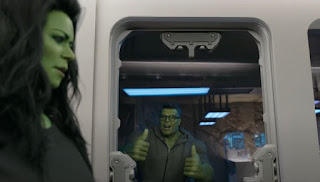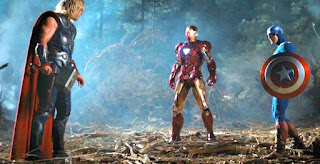As great a film as the original Rocky is, it's not the kind of film that at first glance seems ready made for a franchise. You know, it's a movie about an underdog boxer living in a crummy neighborhood who gets an unlikely chance to hit the big time and it all leads up to that final match and, well, that's kind of it. At the end of Rocky it feels like the story has been fully told. 1979's Rocky II was such a retread of the original that, well done as it was, it only seemed to confirm that the story potential of the series had already been exhausted. I mean, in II Balboa just goes up against Apollo Creed again. I don't know. Kind of seems like we're done here, right? But hold on, because the '80s are coming. Cue up Survivor's "Eye of the Tiger!"
As much as Rocky and its first sequel had been '70s hits, it took the '80s to really make a true franchise out of the series. The appeal of the original Rocky in '76 had been that its uplifting quality represented an antidote to the prevailing cynicism and defeatism of the decade.The '70s wasn't an especially triumphant period of time. America wasn't feeling a lot of big wins back then. In the original, Rocky loses his match, with simply going the full twelve rounds with Creed and winning the love of Adrian being his victories. He earned a more definitive win in Rocky II, officially becoming the champ, but Rocky's wins were only going to get bigger and better in the '80s.
People thought Rocky was a feel good saga before but, man, they hadn't seen anything yet. It's like the series, and writer/star Sylvester Stallone, had been waiting all along for the '80s to happen and when it did, it was the perfect fit of character and decade.
The Bad News Bears had been another sports related '70s franchise (and, like Rocky, it started in '76) where the protagonists had actually lost at the climax of the original film with the sequels making them into winners but the Bad News Bears franchise sputtered out after two poorly received sequels (ending with '78's The Bad News Bears Go To Japan) and a failed TV series that, post-cancellation, limped its way over the finish line into 1980. The '70s was the time of the lovable loser and The Bad News Bears and Rocky had reflected that. The '80s, however, was reserved for winners only and Stallone's Rocky was more than ready to join that company. The original Rocky was an anticipation of where the mood of the country was headed as we slowly crawled out from under our post-Vietnam, post-Watergate malaise and once the Reagan era arrived and a new morning in America was here, Rocky was primed to meet the moment and become a poster child for the feel good '80s. As the trailer for Rocky III proclaimed, Rocky was "an American tradition."
Rocky III embraced the mood of the times to a (Mr) T. The storyline was no less predictable than that of the first two but III saw the Rocky saga transform from being simple boxing pictures to becoming the equivalent of superhero spectacles, with Rocky not just taking on other boxers but battling larger than life supervillains. Unlike Carl Weathers' slick, erudite Apollo Creed, Mr. T's Clubber Lang was a fucking beast. As Burgess Meredith's Mick says, he's a "wrecking machine." Clubber works out alone in a dank basement with poor lighting and, like, dangling chains and leaky pipes or whatever (I could just be imagining the chains and the pipes but it feels like they should be there) and he says things in interviews like "I'm gonna torture him. I'm gonna crucify him. Real bad." and, of course "I pity the fool."
In the director's chair again after Rocky II, Stallone immediately establishes Rocky III a product of the MTV era as he sets up the entire movie via an opening montage before the titles even roll. We never get any dialogue or dramatic scenes to set up who Clubber is, where he came from, or to flesh out his conflict with Rocky. No, we get a music video, set to the entirety of "Eye of the Tiger," and that's all we need. As "Eye of the Tiger" plays out, we see Rocky being a big time celebrity, shilling for products like American Express and clowning with the Muppets while Clubber stalks Rocky's matches like a slasher villain, glowering at the champ's bogus wins and steadily annihilating his own opponents.
In Stallone's most inspired move, he brings back Carl Weathers' Apollo Creed, installing him as Rocky's new trainer after Clubber turns Rocky into paste in their first match, an event so traumatic that it leaves Micky dead. Bringing Weathers back in this capacity was such a smart way to not just keep Weathers involved but to elevate Clubber as an adversary. The fact that Rocky has to team up with his former rival if he's going to have any chance of beating Clubber only makes the challenge of taking down Clubber feel that much more serious. The ensuing friendship that develops between Rocky and Apollo is one of the highlights of the entire series and one of the great bromances in cinema. There just aren't a lot of platonic male relationships on film that feature the two dudes frolicking in the waves together. None, in fact, besides this. There should be many more, I agree, but this is all we've got.
The most surprising aspect for me in revisiting Rocky III is being reminded that the story hinges on Rocky being past his prime. He might still be thriving as a celebrity but as a boxer, he's pretty much washed up. So much so that Mick keeps putting him up against has beens. Rocky is ready to retire and publicly does so at the unveiling of his statue before Clubber calls him out with a taunt of "Don't give this sucker at statue! Give 'im some guts!" Balboa is said to be 34 years old here, which does not seem all that old from today's perspective where Tom Brady is still a star athlete at 44 (and whose own retirement lasted a blink of an eye!) but this movie is built on the idea of Rocky facing down the end of his boxing career and Apollo being firmly over with his. Incredibly, these two are supposed to be a couple of old dudes fighting off their own impending obsolescence! I always remember that aspect as being key to Rocky IV but I had forgotten that the path to that was already laid down here. I just find it wild that as Stallone was just starting to ramp up into the prime of his own career that his signature character was supposed to be past his best days.
Some will say that this and 1986's Rocky IV were too cartoony, arguably even bordering on parody, and that they erred in taking the series away from its down to earth roots. Stallone himself might, to some extent, agree with that as beginning with 1990's Rocky V, he purposely kept driving the series back to the more realistic vibe of the first two films. Maybe that was the smart move, I don't know. Maybe it was the only viable choice Stallone had at that point because after Clubber and Drago, what non-cyborg adversary could believably top either one of them? If you didn't dial things back, you'd have to have aliens come to Earth to pit their greatest fighter against ours with the fate of the planet on the line. Personally, I do think that would have been the way to go but what do I know? I'm just someone who walked out of Rocky III in 1982 feeling on top of the world and I think the series could have kept chasing bigger and better highs.
You know, I'll just say this: I remember what the mood of the audience was like in III and IV and, man, it was not the same for the opening night of V. Imagine if after 2011's Fast Five if the Fast and the Furious producers had thought their next move should be to take the series back to its street racing roots. Not an option, right? Of course not. By F9, ten years later, these characters are driving cars in outer space! When it comes to sequels, you gotta always keep leveling up, even if that means that, oh, now Rocky's boxing a werewolf.
A lot of great movies in the summer of '82 missed with audiences but Rocky III was not one of them. It was absolutely a movie of its moment. Released on May 28th, 1982, it landed every punch with precision and walked away a box office champ. You didn't have to train with Apollo that summer to get the eye of the tiger. You didn't even have to work up a sweat. You just had to watch Rocky III.


















































